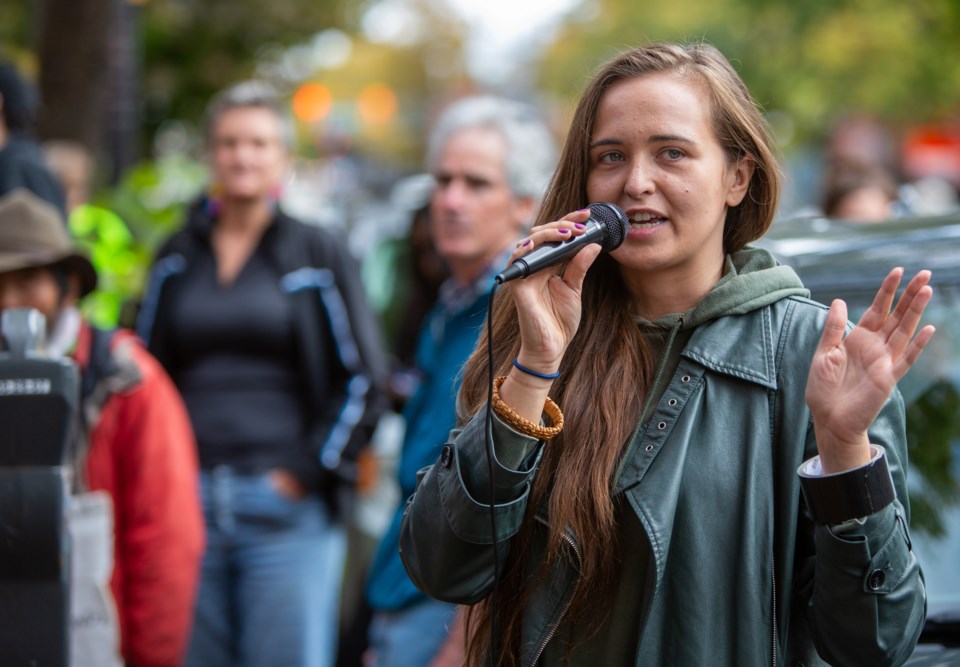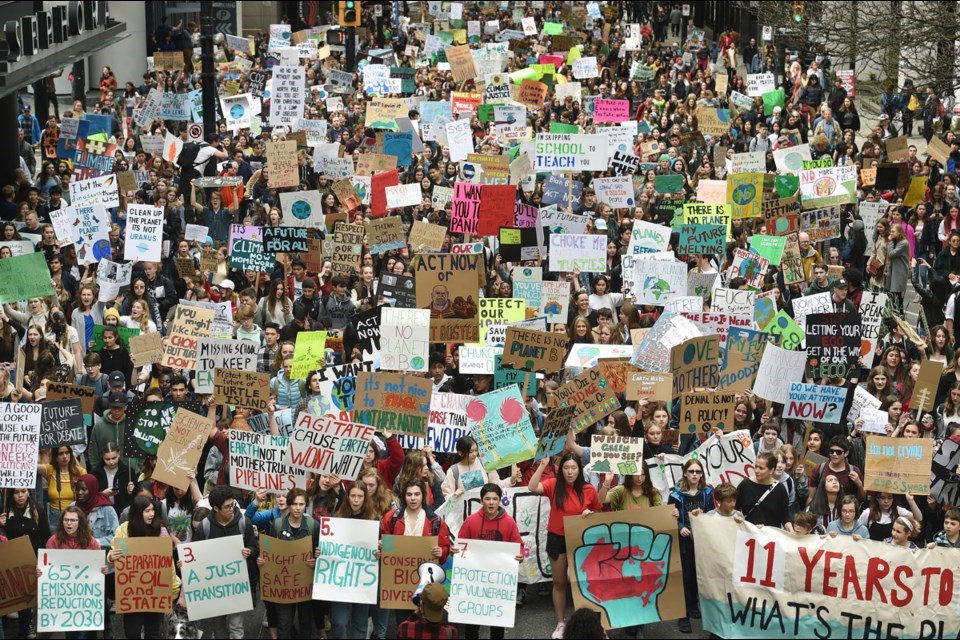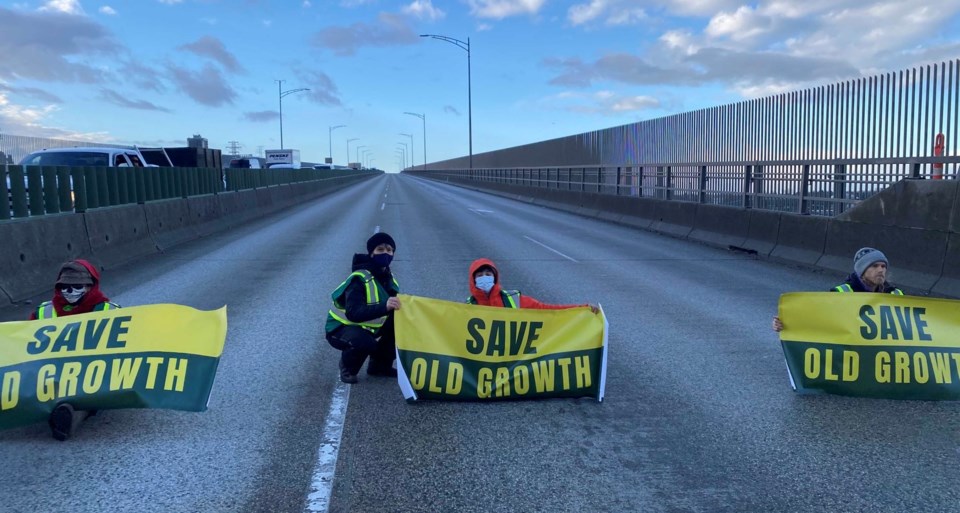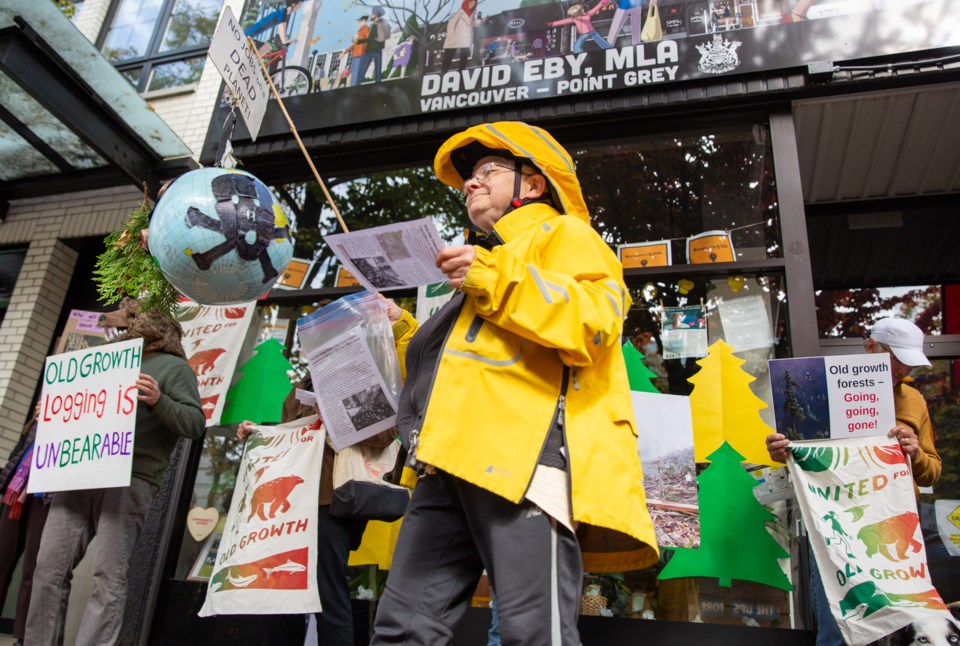Ann Grant, 82, has taken to the streets for 20 years in an effort to get governments to respond to climate change.
Saving old growth forests is another concern of the environmental activist.
It’s what brought her out Sept. 28 to a rally in front of Premier David Eby’s constituency office on West Broadway, where she joined an estimated 75 people to protest what they say is the B.C. government’s inaction on stopping old-growth logging.
Dressed in bright yellow cycling gear, and carrying a homemade protest prop — a long stick attached to a small globe, with a paper bald eagle on top and a sign that says “No jobs on a dead planet” — Grant was a noticeable presence.
“You’ve got to take a stand,” she said. “We are seeing more and more the huge effects of not dealing with climate change. We get all this talk from government that ‘Oh yes, we're doing stuff about it.’ But when it comes down to it, they're not doing what it takes.”
The passion Grant brought to last week’s protest was shared by other activists at the event, including Eric Schwartz and Tegan Hansen, who were not surprised to learn Vancouver is on track in 2023 to set a new record for demonstrations.
Vancouver police say 800 protests have already occurred in the city and it is expected the grand total will reach or surpass 1,000 by year’s end — a significant and steady increase from 563 recorded in 2020, 785 in 2021 and 810 last year.
The majority, police say, have been tied to the environment.
“People are seeing the floods, they're seeing the forest fires, we're breathing the smoke, and we want our government to do something about it,” said Schwartz, one of the organizers of the event outside Eby’s office.
“It's simply people reacting to the situation they're seeing. It's undeniable anymore.”

'Frustration getting higher'
Schwartz and Hansen were among thousands of protesters who participated in a Sept. 15 “climate strike” rally that saw people march from Vancouver city hall across the Cambie Bridge to the Vancouver Art Gallery.
Hansen, the senior forest campaigner at Stand.earth, said a combination of people directly experiencing the effects of climate change and being frustrated by the slow pace of government to make positive change has led to the rise in activism in B.C.
“So what people are left with when they go to the polls to vote and nothing changes is they have to take to the streets,” said Hansen, who took a turn at the microphone during the rally outside Eby’s office.
“What we're seeing is the reality of the situation, with the impact getting worse and the frustration getting higher.”
Police Chief Adam Palmer signalled to the Vancouver Police Board in June 2021 that protests were on the rise in the city, saying “by far and large, the greatest number of protests we’re seeing are environmental — whether it’s logging, [protecting] old-growth forests, TMX pipeline — those sorts of protests [are] way more than anything else.”
Palmer updated his comments at a police board meeting last month, where he said the VPD anticipated 1,000 protests or more will have occurred in Vancouver before year’s end.

Police costs exceed $3 million
While environmental concerns have been the primary reason for the action in the streets, people protested a myriad of issues this year, including demonstrations related to COVID-19, Prime Minister Justin Trudeau, the 2SLGBTQ+ community and the murder of Sikh separatist leader Hardeep Singh Nijjar.
Overdose deaths and Indigenous issues have also triggered demonstrations.
Officers don’t attend all protests — they had no presence, for example, at the rally outside Eby’s office — but they do keep track of the costs when they show up to police an event.
Statistics supplied to Glacier Media show a steady increase on money spent to manage protests and demonstrations, with $478,460 in 2018, $1,033,297 in 2019, $2,835,584 in 2020 and more than $3 million last year.
Police could not immediately provide a cost for 2023.
Deputy Chief Fiona Wilson said the increased costs add additional pressure to the VPD’s budget. Wilson pointed out the department doesn’t receive money from the provincial government to offset costs associated to protests in Vancouver, which is seen as the epicentre in B.C. for people to demonstrate.
“It is clearly very different here in Vancouver than it is in some of those other bedroom communities such as Abbotsford, Surrey and Delta — people aren't going there generally to protest old-growth [logging],” she said.
“So it's definitely a massive budget pressure and something that we will definitely be flagging this year as we move forward in our budget negotiations.”

Shutting down bridges
In recent years, some of the higher costs have been associated to protests where people have either shut down or attempted to shut down the Burrard Bridge, the Lions Gate Bridge, the Ironworkers’ Memorial Bridge and major intersections.
That type of action, which has led to arrests, has waned this year.
Grant said she has participated in some of what she described as the “more hostile” demonstrations with groups such as Extinction Rebellion, where she stood in front of cars.
“I don't think it was a great idea, but we did that — it was frightening,” she said. “I'm not a particularly courageous person, but there are certain issues where you think you've got to take a stand.”
The demonstration outside Eby’s office coincided with 15 others at MLA offices across the province. Schwartz said the purpose of the widespread action was to amplify the call for the immediate halt to logging of old-growth forests.
He said the provincial government committed three years ago to support 14 recommendations from the Old Growth Strategic Review panel, but none has been fully implemented.
“A year ago, in November 2022, David Eby came forward and said that he would accelerate action on old-growth forests,” Schwartz said. “A year later, old growth forests are continuing to fall.”
Forests Minister Bruce Ralston
B.C. Forests Minister Bruce Ralston acknowledged in an email to Glacier Media that residents care deeply about forests. Ralston said he understood their passion and respected their right to peaceful protest.
“We also share their desire to protect old-growth forests,” said the minister, who confirmed what Schwartz said — that government is committed to all recommendations from the old-growth review panel.
In the past year, he said, “we have reached 2.25 million hectares of old growth deferred or protected since November 2021, with work on further deferrals underway with rights and title holders.”
Ralston said the government has updated laws and regulations to “embed an ecosystem health approach” in forestry decision-making. Government has also created the “silviculture innovation program” to develop more alternatives to clear-cutting such as selective harvesting.
“We have also accelerated the shift from industry-developed stewardship plans to Forest Landscape Plans developed in collaboration with local communities and First Nations to better manage for ecological and cultural values,” the minister said.
Ralston and his fellow MLAs returned to the legislature this week.
Grant, Schwartz and Hansen are hopeful politicians will clearly understand the importance of this session and make meaningful changes that benefit the planet.
In the meantime, more protests are expected.
“I would hope people don't have to shut down bridges to get their message across,” Hansen said.
“But if governments continue to tell people that they're doing the thing they said they would do, and then we know that that's not true, I think people are going to do whatever it takes.”
Added Hansen: “People are feeling like they have to do something. We're talking about life on Earth, right. What would you be willing to do?”




